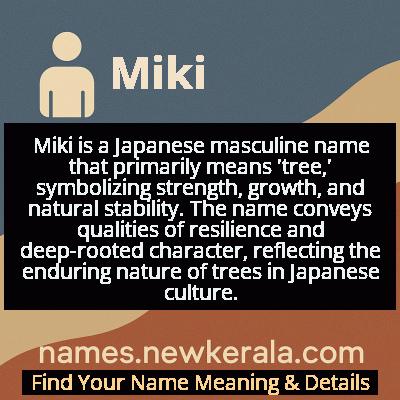Miki Name Meaning & Details
Origin, Popularity, Numerology Analysis & Name Meaning of Miki
Discover the origin, meaning, and cultural significance of the name MIKI. Delve into its historical roots and explore the lasting impact it has had on communities and traditions.
Name
Miki
Gender
Male
Origin
Japanese
Lucky Number
6
Meaning of the Name - Miki
Miki is a Japanese masculine name that primarily means 'tree,' symbolizing strength, growth, and natural stability. The name conveys qualities of resilience and deep-rooted character, reflecting the enduring nature of trees in Japanese culture.
Miki - Complete Numerology Analysis
Your Numerology Number
Based on Pythagorean Numerology System
Ruling Planet
Venus
Positive Nature
Harmonious, responsible, caring, and artistic.
Negative Traits
Overly idealistic, superficial, possessive, or jealous.
Lucky Colours
Pink, turquoise.
Lucky Days
Friday.
Lucky Stones
Diamond, turquoise.
Harmony Numbers
2, 3, 9.
Best Suited Professions
Artists, musicians, teachers, healthcare workers.
What People Like About You
Warmth, nurturing nature, artistic flair.
Famous People Named Miki
Miki Ando
Figure Skater
Two-time World Champion and first female skater to land a quadruple jump in competition
Miki Nakatani
Actress
Award-winning Japanese actress known for roles in 'Ring' and 'Memories of Matsuko'
Miki Berenyi
Musician
Lead vocalist and guitarist for the British alternative rock band Lush
Miki Yamane
Soccer Player
Japanese professional footballer who plays as a defender for Kawasaki Frontale
Name Variations & International Equivalents
Click on blue names to explore their detailed meanings. Gray names with will be available soon.
Cultural & Historical Significance
In contemporary Japanese society, Miki maintains its cultural relevance through its connection to nature appreciation and environmental consciousness. The name embodies the Japanese aesthetic of wabi-sabi, finding beauty in natural imperfection and transience. It also reflects the cultural value of group harmony, as trees in forests support each other through interconnected root systems. The name's enduring popularity demonstrates how traditional values continue to influence modern naming practices while adapting to contemporary sensibilities.
Extended Personality Analysis
Individuals named Miki are often perceived as grounded, reliable, and deeply connected to their roots, much like the trees their name represents. They typically exhibit strong character traits of patience and resilience, able to weather life's challenges with remarkable stability. These individuals tend to be thoughtful and introspective, often serving as pillars of support within their social circles. Their growth-oriented mindset means they continuously seek self-improvement while maintaining strong connections to family and tradition. Mikis are known for their practical wisdom and ability to provide shelter and support to others during difficult times.
In social settings, Mikis often display a calm, steady presence that others find comforting and trustworthy. They tend to be excellent listeners who offer thoughtful advice when sought. While not necessarily the most outgoing individuals, they form deep, meaningful relationships built on mutual respect and loyalty. Their problem-solving approach is typically methodical and well-considered, reflecting the gradual but sure growth of trees. Mikis often excel in roles requiring patience, consistency, and long-term vision. They balance traditional values with adaptive thinking, much like trees that maintain their essential nature while adapting to changing seasons.
Modern Usage & Popularity
In contemporary Japan, Miki remains a popular masculine name, though its usage has evolved significantly. While traditionally given to convey strength and natural connection, modern parents often choose it for its simple, international-friendly pronunciation and positive associations. The name maintains steady popularity rankings, typically appearing in the top 200-300 boys' names in Japan. Internationally, Miki has gained recognition through Japanese cultural exports, particularly in entertainment and sports. The name's adaptability makes it suitable for global contexts while retaining its Japanese identity. Recent trends show increased usage among families valuing both traditional meanings and modern accessibility. The name has also seen crossover appeal, with some Western parents adopting it for its unique sound and positive connotations. Digital globalization has further boosted Miki's international profile, making it recognizable while maintaining its cultural authenticity.
Symbolic & Spiritual Meanings
Symbolically, Miki represents the enduring qualities of trees - strength through flexibility, deep roots providing stability, and continuous growth throughout life. The name embodies the concept of 'nourishing shelter,' suggesting someone who provides protection and support to others. Like a tree that weathers seasons, Miki symbolizes resilience and adaptability while maintaining core identity. The name also carries connotations of wisdom accumulated over time, much like the rings of an ancient tree recording years of experience. In metaphorical terms, Miki represents the bridge between earth and sky - grounded in reality while reaching for higher aspirations. The name suggests a person who grows stronger with challenges and provides shade (comfort) to those around them. It symbolizes the cycle of life, renewal, and the quiet dignity of steady progress rather than flashy achievement.

